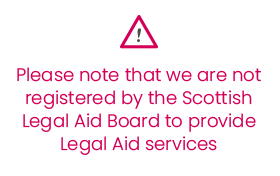Cohabitation Rights & Business Owners Glasgow, Scotland
Prior to 2006, couples living together had few legal rights in the event of separation or death of one of the partners.
However, in 2006, the Family Law (Scotland) Act created a new legal framework for couples cohabiting providing greater protections for them without going so far as those offered to married couples or those in a civil partnership.
The Act created two new rights for cohabitants: a claim on separation and a claim on death. Essentially, for a successful claim, Scots law requires a cohabitant to demonstrate they have been economically disadvantaged, or their former partner has been advantaged, so that the claimant has ended up relatively worse-off. Where an ex-partner is a business owner, establishing the economic impact and fairness in these circumstances may not be straightforward.
Business Interests and Separating Cohabitants
If partners, who have been living together, separate they have fewer rights than couples who were married or in a civil partnership. Clearly, it is preferable that agreement can be reached with an ex-partner about arranging their financial affairs but where this is not possible being a business owner can complicate matters further especially if no cohabitation agreement was put in place. There is no automatic right to a claim against the ex-partner for a share of any business or share of a business owned once separated. However, if the partners had run the business together, or one had been promised a share in it, or made a financial contribution to the business, then it is possible that a claim for compensation may be successful. It will be necessary to show that an “economic disadvantage” has been suffered in consequence by one partner or that the other ex-partner has gained an “economic advantage”. The disadvantaged partner has one year from the date of separation to make a claim for a lump sum.
Cohabiting couples who are separating may not agree on how much a business is worth and it may be necessary to appoint experts to value the business. Even then this process may not be straightforward where the business is privately owned, or there are a number of owners, what company structure has been used and the view of the business’s financial prospects.
Making a claim can be expensive so legal advice is recommended before taking any court action.
Business Interests and a Deceased Cohabitant
The Act makes it possible to make a financial claim in the case of a partner’s death in the case of intestacy (i.e. where one partner dies without a Will). The claim needs to be made within six months. To protect your partner, it is important to write a Will outlining who you wish to inherit your business interests.
Cohabitation Rights Lawyers Glasgow, Scotland
If you are currently cohabiting, or considering doing so, Miller Samuel Hill Brown, Solicitors can advise you on the law relating to cohabitation and the benefits of a cohabitation agreement. For further information in relation to cohabitation issues, including those where business ownership is involved, please contact a member of our Private Client Department- based in Glasgow City Centre our lawyers also help clients in Glasgow’s West End, South Side, Paisley and across Renfrewshire, Lanarkshire and Central Scotland. Please call us on 0141 221 1919 or contact us via our online enquiry form.













